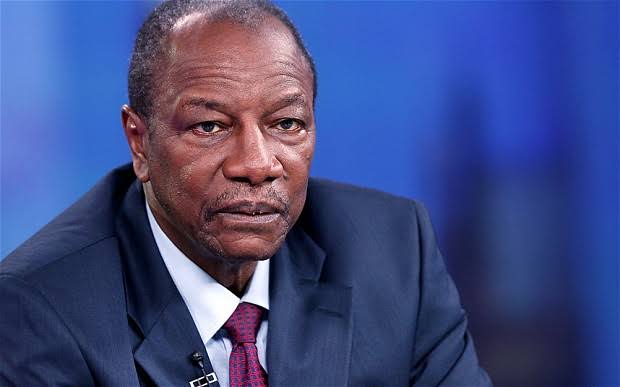Guinean President Alpha Condé was seen in an unverified video being held by soldiers hours after heavy gunfire was reported near the presidential palace in the capital, Conakry.
Asked in the video to confirm he was unharmed by the soldiers, President Condé refused to respond.
Another video also showed a soldier, flanked by two others, saying the country’s borders had been closed, the constitution suspended, and President Conde detained.
The president’s whereabouts could not be ascertained at the time of this report.
However, AlJazeera quotes the defence ministry spokesperson as saying the attempted uprising had been put down.
“The presidential guard, supported by the loyalist and republican defence and security forces, contained the threat and repelled the group of assailants,” it said in a statement.
“Security and combing operations are continuing to restore order and peace.”
The coup has sparked fears among the civilian population, two among whom had sustained gunshot wounds, according to witnesses Reuters spoke with.
There are also reports that soldiers have been dispatched to patrol the streets of Conakry and mount the presidential palace.
Local tabloid, Guineenews, reported that President Alpha Condé was arrested by special forces led by Commander Mamady Doumbouya, believed to be the leader of the putsch.
Al-Jazeera quoted a senior government official as saying the president was unharmed.
Guineenews also said top officials of the government were also taken into custody by the special forces, an elite army corps said to be dissatisfied with the regime.
The details of what looks like a coup are still hazy, but Reuters news agency quoted a military official as saying that the bridge connecting the rest of the city to the Kaloum neighbourhood had been sealed off with many soldiers patrolling the palace. The neighbourhood is home to major government infrastructure, including the presidential palace.
When elected in 2010 after decades as an opposition candidate himself, Mr Condé, 83, became the first freely elected president in the country’s history.
In July 2011, he survived an assassination scare after the presidential residence was shelled, resulting in the death of a presidential guard and the injuries of two others.
A graduate of Pantheon-Sorbonne University, President Condé had seen out his second term limit in 2020 when he stated that a March 2020 constitutional referendum allowed him to run for a third.
He was reelected last year for a third term after winning 59.5 per cent of the votes, a result the opposition rejected alleging that it was fraught with fraud, triggering violent protests across the country.
He has been criticised for his handling of the protests and ones before them.
Guinea’s economy has seen a sustained rebound under him from the country’s bauxite, iron ore, gold and diamond wealth, but the far-reaching impacts have not trickled down to the majority of its citizens.
The coup in Guinea occurs months after coups in two other West African countries: Chad and Mali.

